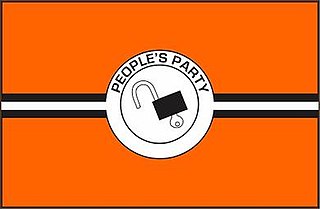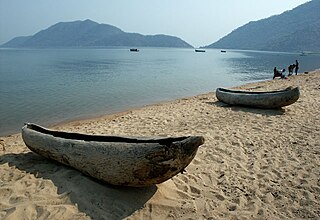
Bingu wa Mutharika ) was a Malawian politician and economist who was President of Malawi from May 2004 until his death in April 2012. He was also President of the Democratic Progressive Party, which he founded in February 2005; it obtained a majority in Malawi's parliament in the 2009 general election. During his two terms in office, he was noted for being the Chairperson of the African Union in 2010–2011, as well as for several domestic controversies. In 2009, he purchased a private presidential jet for $13.26 million. This was followed almost immediately by a nationwide fuel shortage which was officially blamed on logistical problems, but was more likely due to the hard currency shortage caused by the freezing of aid by the international community He died of cardiac arrest in Lilongwe while in office on 5 April 2012, at age 78.
The Alliance for Democracy is a political party in Malawi that marked its history as laying the foundation for multi-party rule in Malawi. It began as an underground political movement during the Kamuzu Banda era and later evolved to a political party during the multi-party era under the leadership of trade union activist, Chakufwa Chihana. AFORD has a stronghold in the northern region. The president is Godfrey Shawa.
Emmie Takomana Chanika born 26 May 1956 is a Malawian human rights activist. A trained registered nurse, Chanika began working in 1992 as human rights groups started to form and agitate for political change in Malawi which at the time suffered under the dictatorship of Hastings Kamuzu Banda. Emmie Chanika then founded the Civil Liberties Committee (CILIC), which was established in February 1992 as the first human rights organisation in Malawi. Emmie Chanika has been its executive director ever since. Under the banner of CILIC Emmie Chanika has been actively involved in the 1993 Referendum and the 1994 general election Civic Education which led to major democratic change and the end of Hasting Kamuzu Banda's dictatorship in Malawi. Although a trained registered nurse, Emmie Chanika continued to educate herself and among other qualifications obtained her Master of Science degree in Strategic Planning in 2007.

The 2007 Malawian political crisis was started when the Supreme Court of Malawi ruled on 15 June 2007 that the speaker of the National Assembly of Malawi, Louis Chimango, had the power to expel MPs who had changed their party affiliation since their election. This ruling was set to have an enormous impact because the incumbent President of Malawi Bingu wa Mutharika formed his Democratic Progressive Party as a split from the United Democratic Front after the last election, meaning that if Chimango expelled most of the DPP lawmakers, Mutharika would lose his majority in the National Assembly, making a move to impeach him very likely. When the possible impeachment was very close in the session of 3 July 2007, about 41 parliamentarians who would have been victim of this so-called Section 65 clause obtained an injunction against the speaker to prevent him from impeaching them; as chaos erupted in parliament, the speaker postponed the session sine die. On 23 July, parliament got together again to tackle the impeachment issue as well as next year's budget; President Mutharika threatened with early general elections. The injunction also expired on that date. Parliament was then suspended indefinitely as there was no agreement reached on 24 July as to how to proceed regarding the 2007/2008 budget; as the interim budget had only been passed until 31 July 2007, however, it remains to be seen whether the suspension is kept up. In another turn, concerned citizens sued the National Assembly for violating their right to development by failing to pass a budget; according to the chairman of the Malawi Law Society, the suit has good chances of being acted on by the High Court. The president started ruling by decree on 1 August, ordering the allocation of funds in lieu of an actual budget. The SADC Parliamentary Forum has suggested it would be willing to mediate in the crisis. On August 7, the chief justice of the Supreme Court issued an injunction allowing the opposition MPs to continue blocking the budget. Critics have asserted that it would take half a year to organise the large number of by-elections which would ensue if all MPs who had crossed the floor were expelled. The injunction was lifted on 8 August, after public protests ensued. On 14 August, Mutharika set a deadline of two days for the parliament to discuss the budget, threatening to "close down parliament" otherwise. The crisis finally stopped on 23 August, when the opposition parties agreed to stop their fight for section 65, stating that it had been misinterpreted as a fight against the budget.

Goodall Edward Gondwe is a Malawian economist who has served in the cabinet of Malawi as Minister of Finance since 2014. Previously he was Minister of Finance from 2004 to 2009, Minister of Local Government from 2009 to 2010, and Minister of Natural Resources, Energy and Environment Affairs from 2011 to 2012.
Anjimile Mtila-Oponyo is a Malawian development worker and education administrator. They have worked in education administration for the World Bank, International Monetary Fund and the United Nations Development Program where they built schools in Lebanon. They received international attention when they were selected as CEO and head of the Raising Malawi Academy for Girls in Malawi. They are currently a principal secretary in the Ministry of Education in Malawi.
Bazuka Michael Kalwefu Mhango is a Malawian lawyer, educator and politician. He was born in Kasole Village in Karonga District, Northern Region, Malawi. He worked as a Science and Mathematics teacher at Livingstonia Secondary School in Rumphi before he became a lawyer and active in politics and public administration. He is the founder and President of Kaporo Foundation for Rural Development. He is the founder Commissioner for the University of Livingstonia and the commissioner charged with establishing Mzuzu University. His memberships include being on the board of the Malawi Broadcasting Corporation and the One Village One Product Programme. He is a member of the British Institute of Management (MBIM), He is currently a Member of Parliament for Karonga North West and was the former Minister of Justice & Constitutional Affairs and former Minister of Lands, Housing and Surveys.

Arthur Peter Mutharika is a Malawian politician, educator and lawyer who has been President of Malawi since 31 May 2014. Mutharika has worked globally in the field of international justice. He is an expert on international economic law, international law and comparative constitutional law. He informally served as an adviser to his older brother, President Bingu wa Mutharika, on issues of foreign and domestic policy from the onset of his election campaign until the President's death on 5 April 2012.
The 2011 Malawi protests were protests aimed at winning political and economic reforms or concessions from the government of Malawi. On 20 July, Malawian organisations protested against perceived poor economic management and poor governance by President Bingu wa Mutharika and his Democratic Progressive Party. After the first two days of protests, 18 deaths, 98 serious injuries and 275 arrests had been reported. Further demonstrations were organised on 17 August and 21 September The first protest was later cancelled due to the intervention of a UN representative in initiating a dialogue; however, the talks broke down with more protests planned for Red Wednesday through a national vigil.

People's Party is a political party in the Republic of Malawi that was founded in 2011 by Joyce Banda, from May 2009 to April 2012 Vice-President of Malawi, and President since 7 April 2012.
Jean Alfazema Nachika Kalilani is a Malawian politician who has served in the Cabinet of Malawi as Minister of Home Affairs and Internal Security since 2015. Previously she was Minister of Health from 2014 to 2015. She is also the Secretary General of the Democratic Progressive Party (DPP) and second term Member of Parliament for Dowa Central Constituency. As an MP, she served as the Women's Caucus Chair and as the International Relations Chair in the National Assembly. She previously worked for the World Health Organization in Botswana as a country representative.
Henry Chimunthu Banda is a Malawian politician who was the Speaker of the National Assembly of Malawi from May 2009 to May 2014. He was elected in 2009 as the Chair of the 19 member Commonwealth Parliamentary Association, Africa region.
Harvey J Sindima is a Malawian theologian, philosopher, professor and author. He has written extensively on matters of African philosophy, religious ethics and spirituality. He is the original voice behind the Malawian philosophy of personhood: "umunthu". He also works on independent charity project called Blantyre North Relief Project (BNRP) in Blantyre, Malawi with his wife Gertrude Sindima.
Malawian diaspora refers to Malawian citizens and foreign nationals of Malawian descent who relocate—temporarily or permanently—to foreign countries. There are no reliable figures on how many Malawians live abroad. Populations of Malawians can be found in the Americas, Europe, Africa and Asia. Malawians have historically been an important supply of both skilled and unskilled labor to other countries. Malawians were a source of labor to the diamond and gold mines in Southern Africa, particularly South Africa. Many Malawian health professionals have migrated to the Global North in search of employment. The migration of skilled labor has contributed to the brain drain that is affecting many African nations.
The 2012 Malawian constitutional crisis occurred from April 5, 2012 - April 7, 2012 after senior members of the Democratic Progressive Party-led cabinet failed to notify the public of the death of the sitting president, Bingu wa Mutharika on April 5. Instead, cabinet ministers held a series of meetings in Lilongwe, Malawi without vice-president Joyce Banda with the aim of undermining the constitution and Banda's succession to Presidency. News confirming his death had, however, quickly spread across the country through word of mouth, cellphone text messages, Malawian bloggers, Twitter, Facebook, and on listservs by the end of the day on April 5, 2012. Therefore, the failure to announce his death resulted in speculation over the real health of the president and over whether the succession procedures would be followed as outlined in the constitution. According to the constitution, the vice-president takes over but there had been no official word on a successor or communication with the vice-president. Amidst growing speculation, the Cabinet announced that the president's brother, Peter Mutharika, the foreign minister, was the new President of the party on April 6. The Cabinet only announced his death two days after his death, after which Banda became Malawi's first female President.
Malawi–Taiwan relations refer to foreign relations between Malawi and Taiwan. Diplomatic relations existed from 1966 to 2008. There are no current official diplomatic relations between the two countries.
Media of Malawi consist of several different types of communications media: television, radio, cinema, newspapers, magazines and Internet-based Web sites. Malawi also has a growing music industry. Media is either privately owned or government owned.
Mwayi Kumwenda is a Malawian netball player who plays for the Malawi national netball team, the Malawi Queens, and the Suncorp Super Netball franchise, the Melbourne Vixens.

Lazarus McCarthy Chakwera is a Malawian politician who is the current President of Malawi Congress Party since 2013. He is the Leader of the Opposition in the National Assembly following highly controversial elections held in Malawi on 21 May 2019 which he and other opposition figures are disputing in court and they want the elections to be rerun. He was President of the Malawi Assemblies of God from 1989 to 14 May 2013.
EPAC United Football Club is a Malawian football (soccer) club based in Lilongwe that currently plays in the TNM Super League, the top division of Malawian football.







